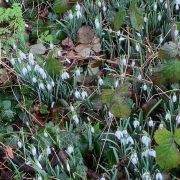Rutile
Last July I was going on about the names of all the different plants that grow wild in Frith Wood, as well as discussing the benefits of geophagia for some reason (the eating of mud or clay). I also think worms came into it, somehow. Click here if you want to revisit.
This July, however, I would like to introduce you to Filipendula ulmaria, or meadowsweet. It could be because it was used in the Middle Ages as a sweetener for mead that it gets its name, but take a whiff and it might remind you of something familiar. Its chemical constituents include salicin, which was synthetically altered because it causes less digestive upset than pure salicylic acid used in drugs, and thus aspirin was created. It was Bayer that named it aspirin after meadowsweet’s old botanical name: Spiraea ulmaria. It does have a whiff of aspirin.
There is a lot of it now flourishing on the sides of the roads all over Herefordshire: fluffy, slightly floppy, pale cream bundles framed by the hedges they grow by. I confess that the real reason I mention meadowsweet is to promote the Ledbury Poetry Festival and Edward Thomas’ poem, Adlestrop:
Yes. I remember Adlestrop—
The name, because one afternoon
Of heat the express-train drew up there
Unwontedly. It was late June.
The steam hissed. Someone cleared his throat.
No one left and no one came
On the bare platform. What I saw
Was Adlestrop—only the name
And willows, willow-herb, and grass,
And meadowsweet, and haycocks dry,
No whit less still and lonely fair
Than the high cloudlets in the sky.
And for that minute a blackbird sang
Close by, and round him, mistier,
Farther and farther, all the birds
Of Oxfordshire and Gloucestershire.
The Festival this year is mostly online, though there are some great events held in Ledbury itself over the weekend of 9 – 11 July. Click here for all the available events (online and non-online). The Festival is on until 11th July. The Barrett Browning Institute in the town centre is the Festival’s headquarters, and if you go in you will find Sally Crabtree.
Her latest installation is a sweetshop of conceptual confectionery which offers each member of the public a small gold coin which they can spend on just one thing at the counter and it explores the notion of choice in our lives-“Choose well. Your choice is brief, and yet endless” as Goethe says. It has the feel of a fairground stall with the excitement that each person goes away with a ‘prize’ so to speak. Of more value perhaps however is that each sweet that they choose comes with its own quirky, philosophical inner layer of meaning which they unwrap, depending on what they choose.
And for children… they can fill a jamboree bag with their own creations inspired by the Sweetshop of Words – including lyrical lollipops, glass sweets and pop a pop a poem balloons!
As I said in the last blog, the difference between poetry and pottery is only a “t”, and some new pieces have emerged out of the kiln which, if not poetic, are at least expressive.
The latest batch of ceramics has seen the rise of an ingredient called rutile. Rutile is a glaze additive that produces colours ranging from light and dark blue, to tan, gold, yellow, and even purple. It has a mind of its own, depending on the glaze base and the firing conditions and, because it is a mined colorant, its makeup also depends on the mine source. Many potters test their batches of rutile before committing to a full bucket of glaze – all the result of the mineral’s notorious inconsistency. But when it works, it produces many crystalline, speckling, streaking, and mottling effects in glazes during cooling in the kiln and thus it is highly prized by potters.
Of course, here at Peter Arscott Ceramics, and following in the contrarian, or maybe heedless, tradition, rutile is not used in this way at all but rather mixed as a powder with water and a viscous agent to produce a colourant that can be applied like paint to the bisque surface of the piece, and then dipped in a transparent glaze. In other words, it is not used as a glaze but as a colour that gives the object’s surface an effect halfway between wood and honey. See for yourselves.
By the way, Brits pronounce it “root ill” and Americans say “root isle”, which I prefer. On the other hand, and digressing wildly, why do Americans say “rowt” when they want to say “route”? Answers please. And since we are on the subject, why do they pronounce “rubbish” as “garbage” and “chips” as “french fries”? I am sure that at least one of the three American readers of this blog will tell me in no uncertain terms.
I got know a resident sparrow, called Edith, busy looking for anything to feed its chicks in their nest in the roof’s gutter. Luckily they were not flooded out, and I felt so sorry for her that I bought a bag of mealy worms. She didn’t want to land on my outstretched hand but was OK on the table, where she would occasionally forget herself and leave a calling card. The fledglings have now flown, and she has lost all interest in visiting. Spurned by a sparrow.


















